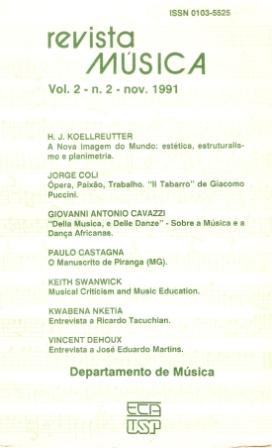Musical Criticism and Music Education
DOI:
https://doi.org/10.11606/rm.v2i2.55030Resumo
I am concerned here with the concept of musical analysis and its role in school and college education. My starting point is simply that musical analysis is the most important branch of musical criticism. By criticism I mean any discourse about music involving judgement or appraisal at any level. Critical statements that have analytical force must by definition say something about how a particular piece of music functions. All analysis is musical criticism but not all criticism is analysis. Analysis cannot be simply an expression of preference or a statement about the social or historical context of a piece of music. Critical statements that are simple expressions of preference or statements about context are not particularly helpful to the process of music education. For this reason I shall confine myself to the branch of criticism we call analysis. Analysis is essentially discourse concerned with the internal functioning of a specific musical object. It is about the integrity of a particular work. To be more accurate, analysis is discourse about our perceptions of a musical object. From an educational perspective it is not helpful to conduct musical analysis as though a work existed independently of individual perceptions of it and in classrooms we have to conduct musical analysis in a way that involves students engaging with music in his or her own way.
Downloads
Downloads
Publicado
Edição
Seção
Licença
Copyright (c) 1991 Keith Swanwick

Este trabalho está licenciado sob uma licença Creative Commons Attribution-NonCommercial-ShareAlike 4.0 International License.
Autores que publicam nesta revista concordam com os seguintes termos:
- Autores mantém os direitos autorais e concedem à revista o direito de primeira publicação, com o trabalho simultaneamente licenciado sob a CC Attribution-NonCommercial-ShareAlike 4.0 que permite o compartilhamento do trabalho com reconhecimento da autoria e publicação inicial nesta revista.
- Autores têm autorização para assumir contratos adicionais separadamente, para distribuição não-exclusiva da versão do trabalho publicada nesta revista (ex.: publicar em repositório institucional ou como capítulo de livro), com reconhecimento de autoria e publicação inicial nesta revista.
- Autores têm permissão e são estimulados a publicar e distribuir seu trabalho online (ex.: em repositórios institucionais ou na sua página pessoal) a qualquer ponto antes ou durante o processo editorial, já que isso pode gerar alterações produtivas, bem como aumentar o impacto e a citação do trabalho publicado (Veja O Efeito do Acesso Livre).


